Gloria Evans doesn’t stride into a room. She slides, as unobtrusive as dawn edging past night, making no more fuss than a robin settling on a fence post. Yet somehow—by some alchemy of presence and intention—every room she enters seems to brighten around the edges. It is not the flash of showmanship, but the slow bloom of a coal banked all night and coaxed back to flame: modest, deliberate, inevitable.
At eighty-two, Gloria measures barely five-foot-five in her orthopedic shoes, but the townsfolk of Marshall, Missouri, speak of her the way homesteaders once spoke of well water or prevailing winds—an elemental fact woven into daily survival. She has served as a Foster Grandparent for seventeen years, logging more volunteer hours than any other senior in Saline County. The program was a federal initiative born in the War on Poverty days that pairs senior citizens with children who need extra attention and care. The program provides a small stipend to low-income seniors who serve between fifteen and forty hours per week, though you'd never catch Grandma Gloria counting the hours or thinking about the money.
The children at Spainhower Primary call her Grandma as naturally as they call the teacher Mrs. or the history teacher Coach. So do the teachers, the janitors, and the post office clerk who sells Gloria Forever stamps in sheets of a hundred because “Grandma” still writes thank-you letters in curling script.
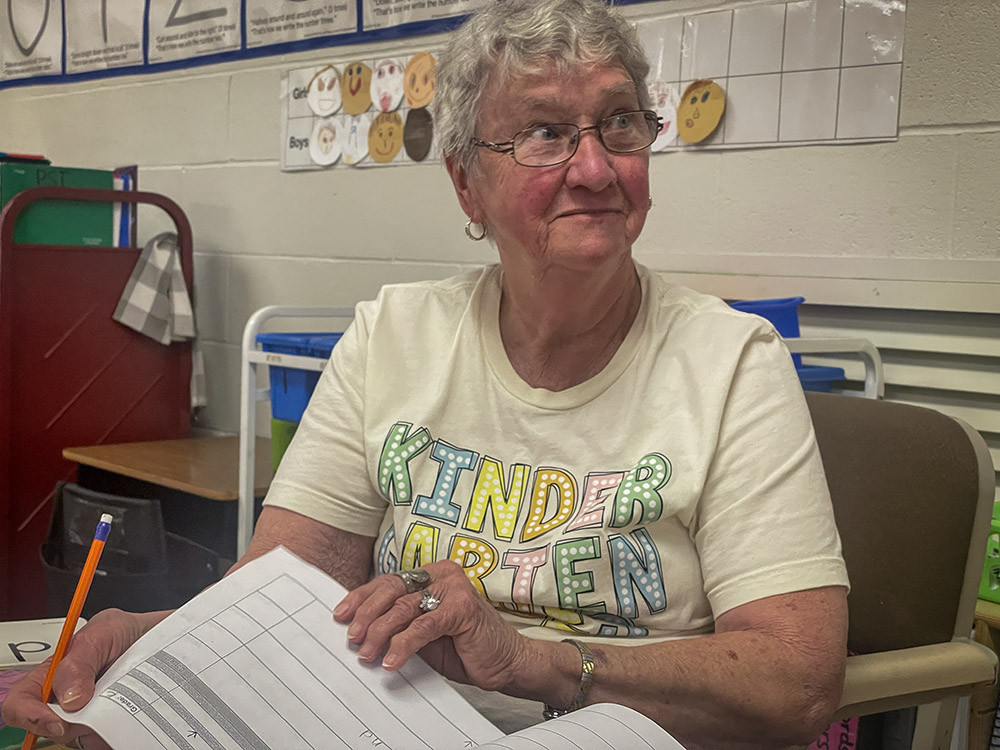
If you drive the square on a Saturday around noon, you might glimpse her through the plate-glass of a diner—silver bun tight, reading glasses perched, tiny bites of raisin-cream pie disappearing between notes scribbled in a spiral memo pad. She is likely listing vocabulary words for phonics lessons, or inventories of glue sticks, or birthdays of every child in Mrs. Oakley’s kindergarten class. She does not bother the waitress for refills; those working have long ago learned to top the mug before Gloria looks up. Small economies like that keep the machinery of Marshall turning.
1 Roots Reaching Back to Dust and Flood
Gloria was born in 1942, on a tenant farm ten miles southeast of town where the Lamine River loops like an old man’s knuckle. Her mother, sewed feed-sack dresses, sold baked pies at church socials, and managed to tuck away coins in a Mason jar for each child’s “going-on” fund—going on to college, or war, or marriage. From her mother, Gloria learned the geometry of generosity: pie divided by eight still nourishes; light divided by windows still shines.
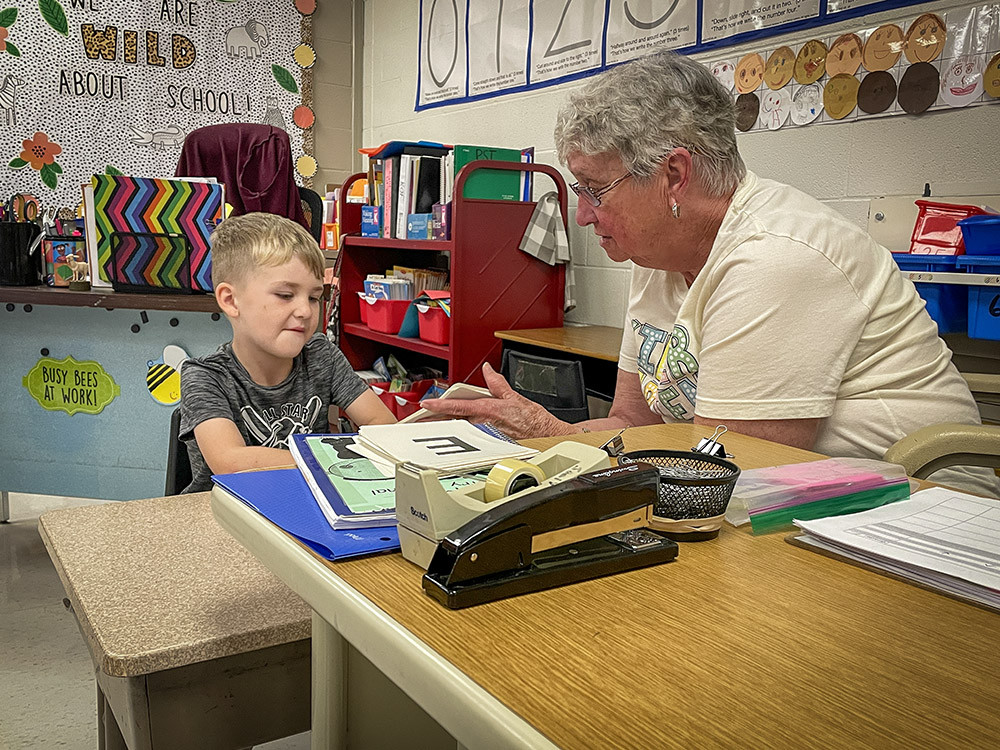
She found the program after her husband passed 22 years ago, at a time when grief had left a hollow space in her days and nights. Widowhood can hollow a house with the efficiency of termites. For half a year Gloria drifted room to room, straightening curtains that refused to misalign, setting two plates at supper and removing one before the amen. Then came the morning she woke to the silence of her own heartbeat and decided loneliness was a choice she could no longer afford.
“I was just lonely and needed something to do,” she says, though there’s a softness in her voice that tells a different story—one of a woman searching not for activity, but for meaning, for a way to matter again in a world that had taken so much from her.
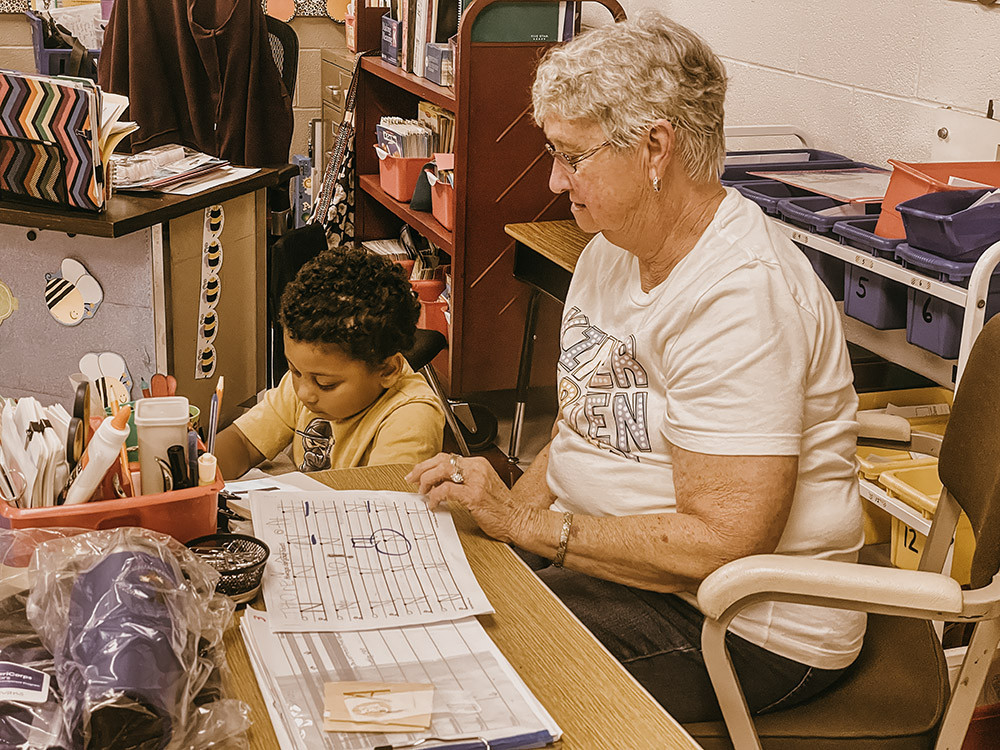
2 The Call That Wasn’t Quite a Calling
Gloria had heard of the Foster Grandparents program here and there around town, didn’t think much about it at first. The program “Wanted—Seniors 55+ to tutor and mentor children. Patience preferred.” She took it as a nudge—nothing mystical, just the ordinary guidance of coincidence, which in small towns is often considered the Holy Spirit’s shorthand.
Orientation was held in the basement of the Martin Community Center. After ingesting all the rules and regulations of the program, Gloria chose Spainhower Primary: “I figured start with the little ones,” she tells me, “maybe it’ll give them a running start at life.”
Seventeen years later Gloria has been through multiple principals, and seventeenth batches of wobbly five-year-olds. The school year now divides into two epochs: Before Grandma and After She Walks Through the Door. Children modulate voice levels at her raised eyebrow; pencils cease fidgeting at her gentle tap; broken hearts glue themselves back together under her humming of a tune so soft only hurt feelings can hear.
3 A Morning in Spainhower
I watch her move through the classroom one day late in October. A flood of fluorescent light glares overhead, but Grandma Gloria seems lit from a different source—somewhere between kerosene lamp and campfire. She squats in a too-tiny chair (never mind the arthritic knees) that brings her down the level of the children. Beside a young boy, whose tongue protrudes in concentration as he reverses his b and d again. Gloria guides his hand with the lightest fingertip touch until the stem faces right. “d for dinosaur,” she whispers, and his shoulders drop in relief. Twenty minutes later a child began to draw, and Gloria, curious, asked, “Oh, what’s that?” The child, without hesitation, responded, “It’s a gun, and it’s going to shoot...” Without breaking her calm, Gloria redirected the moment. “Oh my, no,” she said, her voice firm but kind, “we don’t want to draw any guns now.” The child erased the picture without protest; Gloria shot me a look, half wide-eyed, half grimaced, but with a twinkle of humor. In that moment, it was clear that her magic lies not in what she says, but in the deep well of love and patience from which she draws.
The room is an orchard of sound—chair legs scudding, crayons rattling, the A/C vent rattling above a shelf of phonics readers. Through it all, Gloria floats like dust mote in a shaft of morning sun—present but weightless, visible by grace of the light around her.
4 What the Program Means—and Doesn’t
The national Foster Grandparents Program was launched in 1965 under the banner of Lyndon Johnson’s War on Poverty, pairing low-income seniors with at-risk children. Volunteers receive a modest stipend—barely enough for gas but adequate to satisfy the government that participants are not employees.
Martin Tichenor—regional director, executive-grade optimism and clip-board—explains that Spainhower’s young scholars often come from generational turbulence: addiction, foster care, food insecurity. “Grandma Gloria gives them a grandmother on demand,” he says, “and they treat her like sacrament.” He tells me about bringing volunteers into the county jail for a literacy project: “The moment those orange jumpsuits see a grey-haired lady with a name tag that says Grandma, the whole cellblock goes Sunday-school quiet. It’s reflex. You don’t cuss at grandma.”
The program manual forbids corporal discipline, forbids religious instruction, forbids hugging in the classroom. Gloria signs those compliance forms annually, but culture is stronger than clauses; her hugs are grandmother hugs—quick squeeze, pat-pat, release—and no administrator has yet dared challenge their legality.
5 Thursday Afternoon Grocery Aisle Theology
Gloria’s work doesn’t end in the classroom. As she moves about town—at the grocery store, on the sidewalk—children from the current crop and years past will spot her, squeals “Grandma!” launching across slick tile into a collision worthy of minor-league baseball. Gloria braces, bends, absorbs momentum without visible strain, ready for a hug. “We’re huggers around here,” she says with a smile. But there are rules in the classroom, and while the hugs are frequent outside school walls, inside the classroom, she respects the boundaries.
6 What Keeps Her Going
Even saints tire. Some evenings Gloria lowers herself into a vintage recliner, ankles swelling like yeasted dough, and wonders how many more winters the joints will allow kneeling on kindergarten-height carpets. She does not voice such doubts aloud. Asked why she keeps at it, she shrugs: “I like to be needed. The Lord gave me breath this morning—may as well use it.”
There is, too, the inheritance of habit. Her mother, Edna, sewed quilts for tornado victims, canned fifty quarts of tomatoes each August “in case somebody’s pantry goes bare.” Gloria’s grandmother probably nursed influenza victims in 1918 with nothing but turpentine and hope. Service was a generational dialect in her childhood household; to abandon it would feel like apostasy.
7 The Surprise Gift
At the end of my time with Gloria, passing her the $1,000 cash seemed as natural as taking a breath. At first she just stared at the money, eyes wide, like it was a coiled snake ready to strike. I assured her there were no strings attached; she could do whatever she wanted with it. She said “Oh my goodness” so many times it sounded like a mantra.
After reeling off several possibilities for where the money could go, she came back to the children. “I’ll spend this on the kids,” she said. The most immediate target: an upcoming Halloween party. With a $1,000 to spend, that party will go down as legendary.
8 An Afternoon Walk and Farewell
I drove south toward Sedalia, Spainhower’s school bell fading behind. Ahead lay Oklahoma winds, Arkansas pines, Alabama cotton, the staggered homestretch back to Brenda and a couple of already decorated Christmas trees. I adjusted the rearview mirror and, for five minutes, watched the courthouse dome shrink like a penny dropped down a well. Shadows stretched across harvested fields; crows lifted in lazy swirls from fencerows; the sky prepared its next sermon of weather.
Long after egg cartons become compost and crayons wear to nubs, long after the Vanagon’s tires trace other counties, the echo of Gloria’s patience will still hum in that kindergarten like bees in summer clover. And some grown man or woman, years ahead, will remember a grey-haired lady who knelt to tie a sneaker, who breathed hope into spelling tests, who showed that the world could break your heart and still leave you capable of love.
There’s a saying that the greatest among us are those who serve, and by that measure, Gloria Evans stands among the greatest. She may not think of herself in those terms—she’s far too humble for that—but the community knows. They know the power of her presence, the way her kindness has touched so many lives.
Big gestures don't matter out here. Recognition, if it comes at all, is in the quiet, steady acts of love and service. And in those acts, Gloria has found her place, her purpose. She’s not just “Grandma” to the kids at Spainhower Primary; she’s Grandma to a whole town, and Marshall, Missouri, is richer for it.

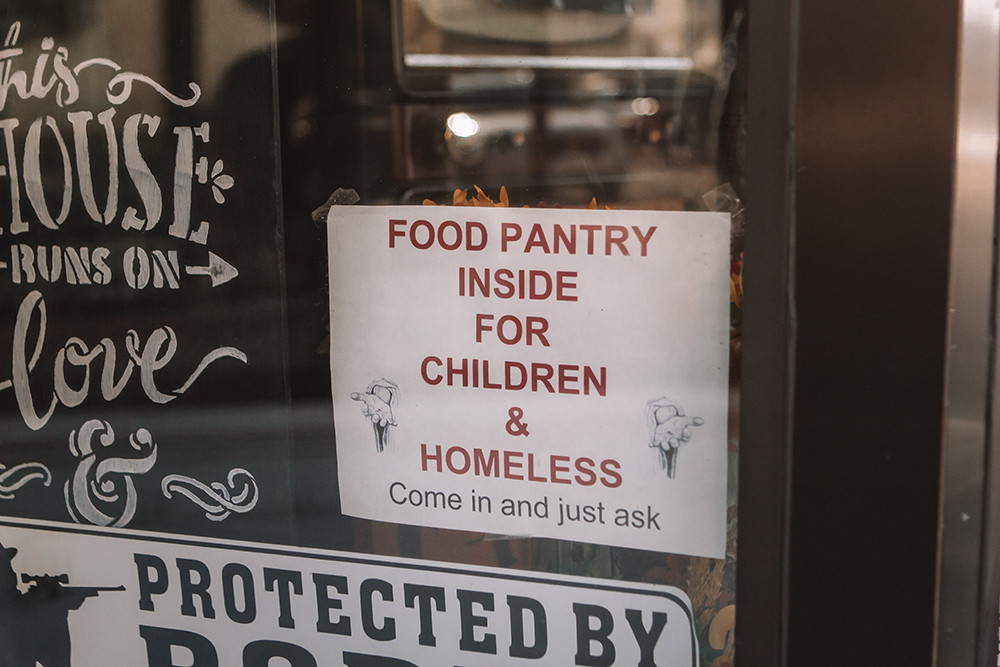

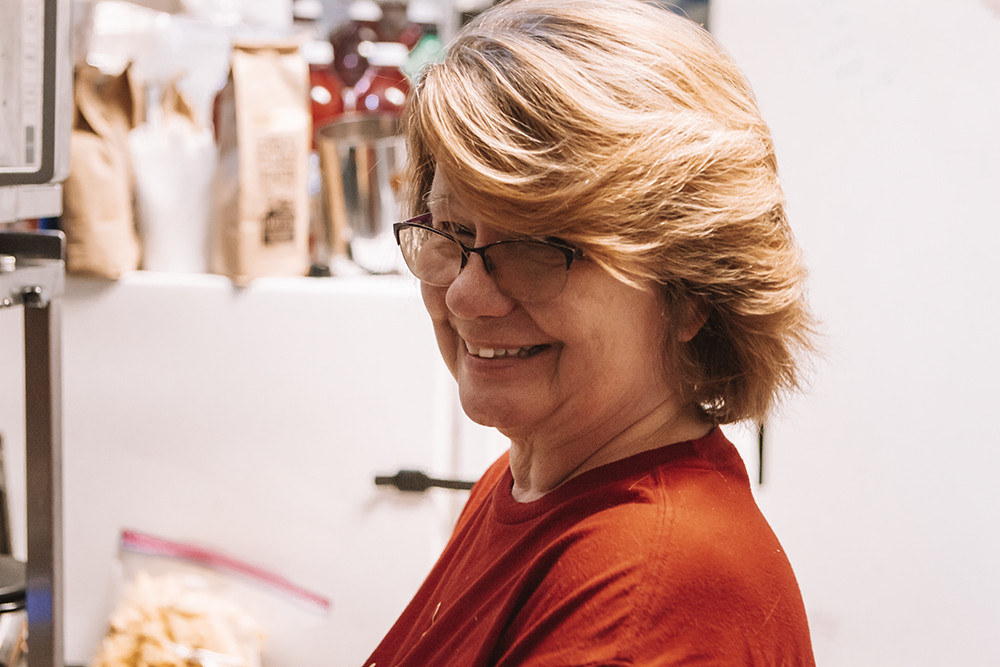

Again, a great story again... thanks for taking us along for the ride.
In tears my friend. I appreciate your gift with storytelling so much.
Wow. Thank you for all you do Cate, and thank you Brock and the Hope & Generosity Tour for bringing this to us. So very powerful.
What a story. The people you are finding have incredible stories and I know how appreciative they are of your generosity.
Fabulous visuals and insight.